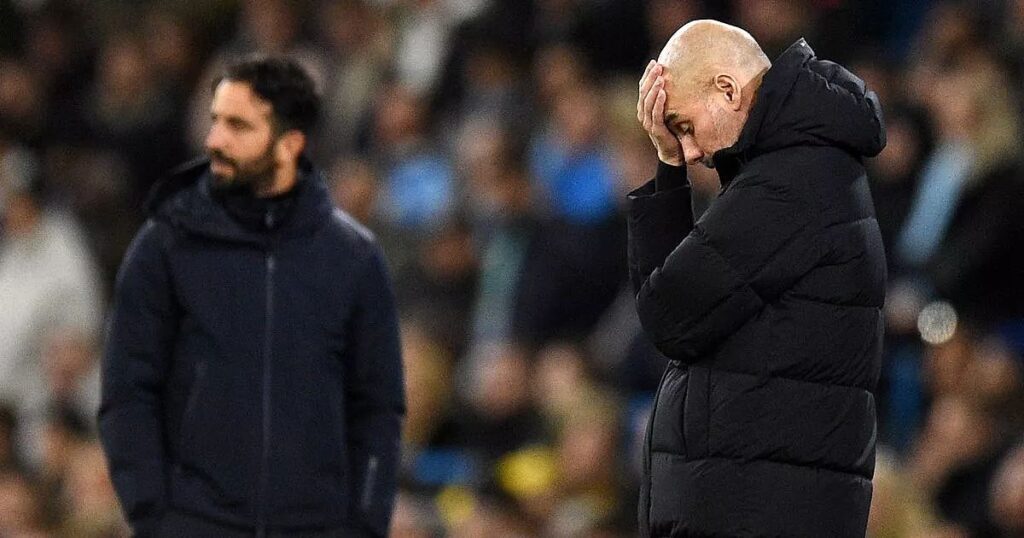Manchester United’s search for a new manager has become a source of continuous speculation and debate among fans and analysts alike. The name currently generating buzz is Ruben Amorim, a figure whose recent rise through Portuguese football has caught the attention of many, especially following insights shared by Manchester City’s Pep Guardiola. This article will delve into Amorim’s qualifications and the broader implications of his potential appointment.
Guardiola’s Perspective on Amorim’s Managerial Prowess
When Pep Guardiola speaks, the football world listens. His thoughts on Ruben Amorim offer a layered perspective that merits attention. Guardiola recognizes Amorim’s skills, particularly noting his successful tenure at Sporting Lisbon. The City manager remarked on Amorim’s ability to maintain composure and tactical awareness during high-stakes Champions League matches, a quality that is invaluable in a league as competitive as the Premier League.
Moreover, Guardiola referenced the praise from Matheus Nunes, a player who flourished under Amorim’s guidance, further reinforcing the Portuguese manager’s reputation. However, Guardiola wisely advised against a rush to judgment regarding Amorim’s potential for immediate success at a club as storied as Manchester United. He highlighted that a manager’s effectiveness is influenced by myriad factors, including the quality of the team, the club’s infrastructure, and the broader footballing environment. Thus, what works in one context may not necessarily translate seamlessly to another.
Amorim’s Track Record: A Closer Look at His Achievements
Ruben Amorim’s career trajectory is marked by significant accomplishments that cannot be overlooked. His time at Sporting Lisbon has seen him construct a formidable squad that consistently competes for titles, demonstrating his capacity to cultivate talent and instill a winning mentality. His tactical versatility and focus on youth development are particularly noteworthy, suggesting a forward-thinking approach that could benefit a club like Manchester United.
Yet, while Amorim’s achievements in the Portuguese league are commendable, questions linger about his adaptability to the Premier League’s intense demands. The unique challenges posed by England’s top tier—ranging from the physicality of the game to the media scrutiny—will test his managerial mettle in ways that he has yet to experience. Therefore, the crux of the matter is whether his strategic acumen and management style will hold up under the heightened pressure of a club with such lofty expectations.
Manchester United’s Deeper Issues: Beyond the Manager
Guardiola’s remarks shed light on a crucial point: the complexities of managing a club like Manchester United extend well beyond the capabilities of any one individual. The club is currently grappling with deeper issues that require more than just a managerial change. Factors such as player performance, team dynamics, and the overarching club strategy all play pivotal roles in the success equation.
It is vital to acknowledge that hiring a new manager, regardless of their pedigree, cannot single-handedly resolve entrenched problems within the club. A singular focus on the managerial position risks neglecting the systemic challenges that have contributed to United’s recent underperformance. Therefore, any potential managerial appointment must be coupled with a comprehensive strategy to address these foundational issues if the club is to reclaim its status as a footballing powerhouse.
The Verdict: A Calculated Risk for Manchester United?
Ruben Amorim represents a fascinating option for Manchester United. His impressive track record in Portugal, combined with Guardiola’s endorsement, lends credence to his capabilities as a manager. However, the unique challenges of the Premier League and the intricate problems plaguing Manchester United necessitate a cautious, calculated approach. Appointing Amorim could be a gamble on his adaptability and capacity to navigate the multifaceted demands of a leading English club.
Ultimately, Amorim’s success will hinge not only on his managerial acumen but also on the club’s willingness and ability to confront its underlying structural and strategic challenges. The decision to hire him could either be a pivotal step towards a brighter future or another chapter in a long history of managerial uncertainty.
Conclusion
Pep Guardiola’s insights provide a valuable lens through which to evaluate Ruben Amorim’s potential as Manchester United’s next manager. While Amorim’s achievements in Portugal are impressive, the road ahead will be fraught with challenges that extend beyond his control. The internal dynamics and strategic vision of the club will significantly influence whether he becomes a long-term solution or merely another name in the club’s managerial history. The decision at hand is complex, and only time will reveal if it was the right one.
As fans and stakeholders, it is essential to remain engaged and informed about the potential implications of this managerial search. Keep an eye on developments, as the future of Manchester United may very well depend on the choices made in the coming weeks.



